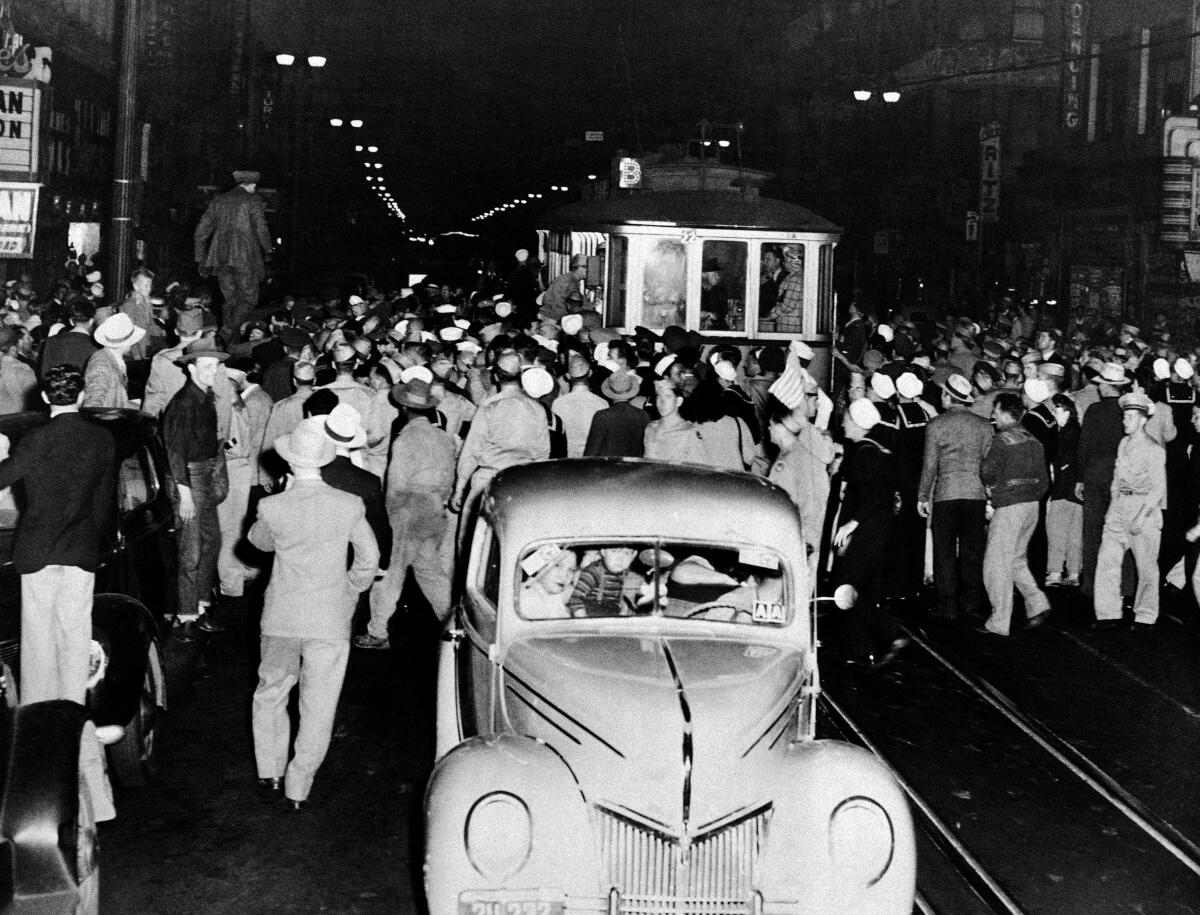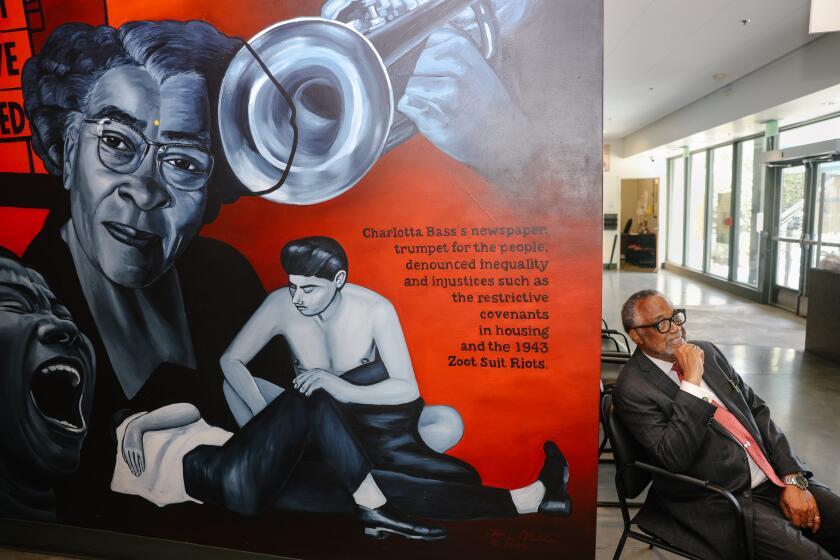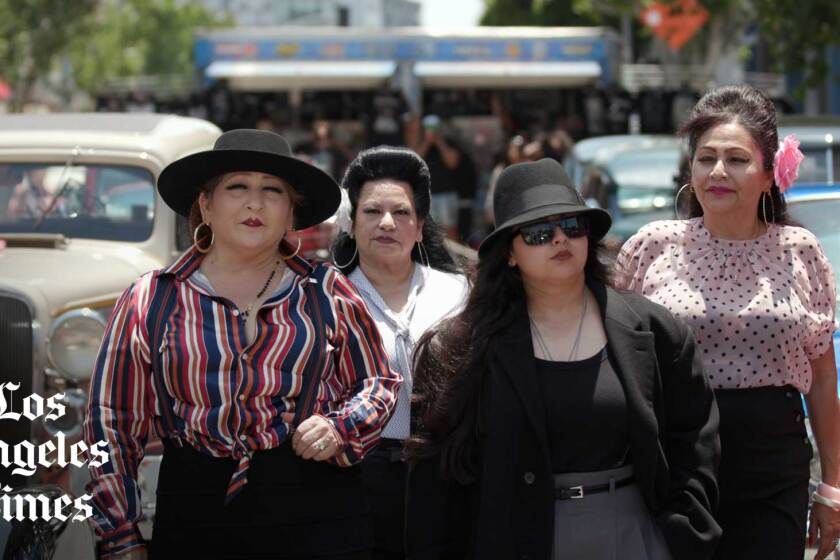L.A. apologizes for city’s role in Zoot Suit riots

- Share via
In the very chamber where Los Angeles City Council members once debated banning zoot suits, city leaders formally apologized Friday for the role the city government played in fueling the brutal attacks on young Latino, Filipino and Black Angelenos that played out across the city eight decades ago.
The apology comes exactly 80 years after the dark chapter in city history where mobs of white servicemen — joined by police officers and civilians — roamed the city instigating brutal attacks on minority youths. The indiscriminate violence was dubbed the “Zoot Suit riots,” named for the baggy suits popular among the young people at the time.
“The city of L.A. can finally take responsibility and apologize for its role effectively sanctioning the violence perpetuated eight decades ago,” said Councilmember Kevin de León, who introduced a council resolution last month condemning the riots.
The council celebrated the historic apology on Friday with zoot suit-clad dancers and remarks from De León and community leaders, who praised the apology as a necessary step in highlighting the role the city played in the weeklong riots.
The unity of two long-neglected communities during trying times is a reminder of what we desperately need in Los Angeles.
“You had young boys — as young as 12 years of age — who were violently beaten, they were stripped of their clothes,” De León said. “Acts that exposed deep-seated racism that targeted Latinos. And just as disgraceful, back in the day, were the actions of our Police Department, the LAPD, and the City Council.”
As De León started his remarks, a few people in the back heckled him, calling him a racist. Others urged them to show respect.
Since De León’s participation in a secretly recorded racist conversation with other city leaders was made public last year, his presence in the council has often brought jeers from protesters.
In the first week of June 1943, minority youths were beaten, harassed and their clothing was ripped off in the streets, according to reports from the time. Some were urinated on in public, De León said.
“I remember my mother distinctly telling me when I was a kid how angry and upset she was watching young Mexican kids running down the street naked from having their suit ripped off,” said Miguel Lopez with the Chicano Moratorium Committee, who was flanked in the front of the council chamber by a few dozen people dressed in pachuco style.
As the speakers stood at the front of council chambers, black-and-white historical images, old newspaper clippings and recent footage of lowriders cruising over the 6th Street Viaduct flashed on two TV screens above the council horseshoe. The newspaper clippings highlighted the support outlets at the time, namely The Times, gave to the cause of the white mobs rather than the victims. “Zoot suiters learn lesson in fights with servicemen,” read one such headline.
Manny Alcaraz, described as a Pachuco culture enthusiast, said he hoped the city’s apology would inform young generations both about the riots and the long list of famous Zoot Suiters who wore the attire the Los Angeles City Council had tried to ban: Cesar Chavez, Cab Calloway and Malcolm X, to name a few.
“This week, tonight, the Zoot Suit riots were ongoing,” he said. “This is what I want the younger generation to know.”
Racial tensions at the time had been heightened by the now notorious Sleepy Lagoon murder trial. After a young Latino man was killed in Southeast L.A., 300 suspects were rounded up, most of them Latino. Twenty-two boys were charged, fueling anti-Mexican sentiment.
Through the resolution, the city formally apologized for wielding their its power to outlaw the wide-legged trousers and billowy coats rather than cracking down on the white mobs perpetrating the violence.
“The Los Angeles City Council and the City of Los Angeles must apologize for responding to these racialized attacks by attempting to pass an ordinance to ban wearing Zoot Suits rather than seeking to protect the community who was directly targeted by this brutal multi-day assault,” the resolution said.
The celebration comes on the heels of a similar apology by Los Angeles County. Last month, the county voted unanimously to condemn the attacks and vowed to fight racial discrimination.
Times staff writer Julia Wick contributed to this report.
More to Read
Sign up for Essential California
The most important California stories and recommendations in your inbox every morning.
You may occasionally receive promotional content from the Los Angeles Times.













